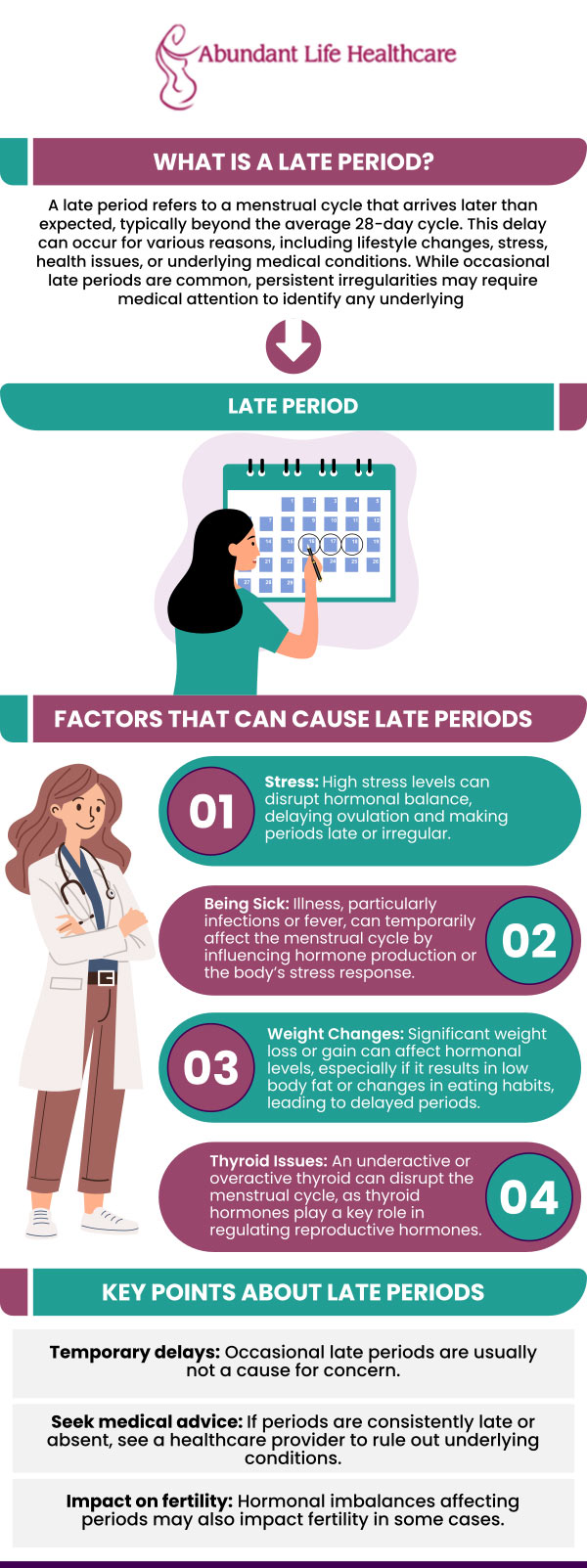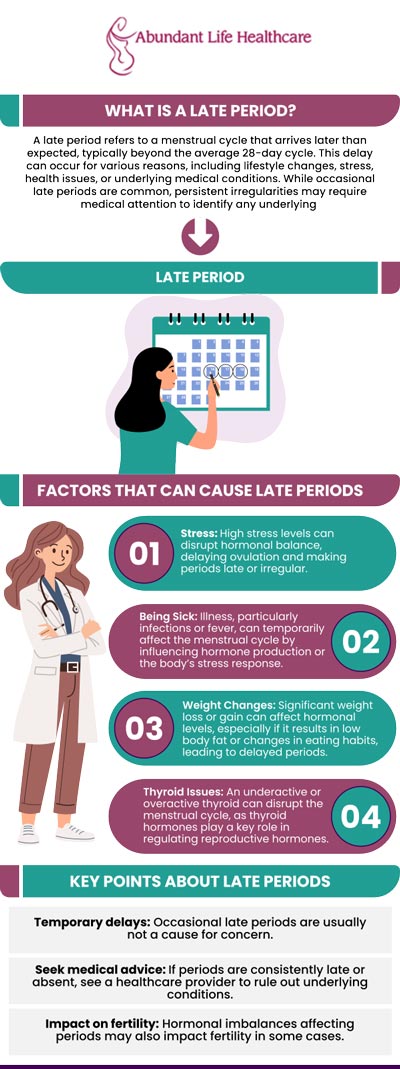Stress, Hormones, and Late Periods: How They’re Connected
Stress, hormones, and late periods are deeply interconnected, as stress can disrupt the delicate hormonal balance that regulates your menstrual cycle. When you’re under stress, your body releases cortisol, which can interfere with the hormones responsible for ovulation. Consulting a Dr. Marc Jean-Gilles, DO, FACOG is crucial if you have persistent irregularities, as they can help determine if the cause is stress or another underlying condition and guide you toward a comprehensive plan. For more information, contact us today or book an appointment online. We are conveniently located at 601A Professional Drive, Suite 370, Lawrenceville, GA 30046.


Table of Contents:
Can acute, short-term stress (like a big exam or travel) cause a delayed period, or is it primarily a result of chronic stress?
How can hormonal imbalances caused by stress delay a period?
When should I seek medical advice about stress-related period changes?
What does a stress period look like?
Menstrual health is an important part of your overall well-being. Many women experience changes in their menstrual cycle during times of acute, short-term stress, such as preparing for a major exam, giving an important presentation, or traveling. It’s important to know that this is a common response.
Acute stress can temporarily disrupt the balance of hormones regulated by your hypothalamic-pituitary-ovarian (HPO) axis. When your body is under stress, it releases hormones like cortisol and adrenaline, which can delay ovulation and, as a result, your period. While chronic or ongoing stress is more often linked to longer-term menstrual irregularities, even a single stressful event can cause a delayed period for some individuals.
These changes are usually temporary, and most people find that their menstrual cycle returns to normal after the stressful event passes. However, if you notice that your periods are delayed frequently, or if you experience other symptoms such as severe pain, heavy bleeding, or missed periods, it’s important to reach out for support.
At Abundant Life Healthcare, we understand that your overall well-being extends beyond physical health to include the complex interplay of hormones that regulate essential bodily functions, like your menstrual cycle. One common issue we help our patients navigate is the effect of stress on hormonal balance and menstrual regularity.
When you’re under significant stress, your body releases higher levels of cortisol, a hormone produced by the adrenal glands. Elevated cortisol can disrupt the hypothalamus, a key area of your brain responsible for regulating your menstrual cycle. This disruption impacts the hypothalamus’ ability to communicate with the pituitary gland, which signals your ovaries to produce crucial hormones such as estrogen and progesterone.
We frequently see patients whose menstrual cycles have become irregular or whose periods are delayed due to stress. This is because stress-induced hormonal imbalances can interfere with ovulation, sometimes postponing it or preventing it altogether. Without ovulation, your period may arrive late, become irregular, or even skip a cycle.
Chronic stress can further exacerbate these hormonal fluctuations, making it even harder for your cycle to return to normal. Our compassionate team is committed to helping you identify the underlying causes of menstrual irregularities, including stress, and to restoring your hormonal balance through individualized care.
If you’re experiencing delayed periods or changes in your menstrual cycle, we encourage you to schedule a consultation with our providers. Together, we’ll develop a holistic care plan that addresses stress management, hormonal health, and your unique needs, so you can achieve abundant health in every aspect of your life.
If you’ve noticed changes in your menstrual cycle, especially during stressful times, it’s important to pay attention to these signals from your body. While occasional variations in your period are normal, certain patterns or symptoms may indicate that stress is affecting your hormonal balance or that another health issue could be present.
If your periods suddenly become very irregular, much heavier or lighter than usual, or stop altogether for several months, we encourage you to schedule an appointment. These changes can be a sign that your body needs extra support, whether it’s for stress management or further evaluation of your reproductive health.
You should also reach out to us if you experience severe pain, bleeding between periods, or bleeding after sex. These symptoms are not typically caused by stress and may require prompt medical attention and investigation.
Additionally, if your menstrual changes are accompanied by other symptoms—such as unexplained weight loss, persistent fatigue, or signs of anemia like ongoing weakness or shortness of breath—please let us know. These may be signs of a condition that needs timely care.
At Abundant Life Healthcare, we’re here to support your mental and physical well-being. If stress is impacting your daily life, causing anxiety, depression, or making it hard to function, our compassionate team can connect you with resources for both your mental and reproductive health.
Stressful periods can present themselves in a variety of ways. You might notice increased anxiety, irritability, or feelings of being overwhelmed. It can become difficult to focus, organize your thoughts, or make decisions.
Physically, stress often manifests through symptoms such as headaches, muscle tension (especially in the neck and shoulders), or an upset stomach. Many people also struggle with sleep during stressful times, whether that means trouble falling asleep, frequent waking during the night, or feeling tired in the morning. Changes in appetite—eating much more or much less than usual—are also common.
Social withdrawal and a loss of interest in activities you usually enjoy can be subtle signs of stress. You may also notice an increased heart rate, sweating, or even shortness of breath. These symptoms are signals from your body and mind that they are under increased pressure.
At Abundant Life Healthcare, we encourage our patients to recognize these signs early. Our compassionate team is here to support you with personalized strategies for managing stress, whether through lifestyle counseling, integrative medicine, or connecting you with additional resources. If you’re experiencing any of these symptoms, don’t hesitate to reach out—your health and peace of mind are our priorities. Together, we can help you restore balance and achieve an abundant, healthy life. For more information, contact us today or book an appointment online. We are conveniently located at 601A Professional Drive, Suite 370, Lawrenceville, GA 30046. We serve patients from Lawrenceville GA, Suwanee GA, Snellville GA, Duluth GA, Dacula GA, Lilburn GA, Loganville GA, Auburn GA, and surrounding areas.
Check Out Our 5 Star Reviews


Additional Services You May Like

Additional Services You May Like
- Obstetrics
- Pregnancy
- Gynecologist
- Birth Control
- Labiaplasty
- Microblading
- Weight Loss
- Semaglutide GLP-1
- Pap Smears
- Pelvic Pain
- Laser Hair Removal
- In House Ultrasound (Including 3D)
- Vaginal Birth After C-Section (VBAC)
- Pregnancy As High Risk
- Multiple Gestations
- Postpartum Counseling
- 24hour/365days On Call Service
- Annual Exam
- Abnormal Uterine Bleeding
- Management Of Endometriosis
- Ultrasound
- Pelvic Organ Prolapse
- Urinary Incontinence
- Perimenopause And Menopause
- Sexual Dysfunction
- Fat Freeze (Like Cool Sculpting)
- Body Contouring
- Ozempic
- Civil Surgeon
- Hormone Replacement Therapy
- Immigration Medicine
- Biote Hormone Pellets
- GLP-1
- Peptide Therapy




